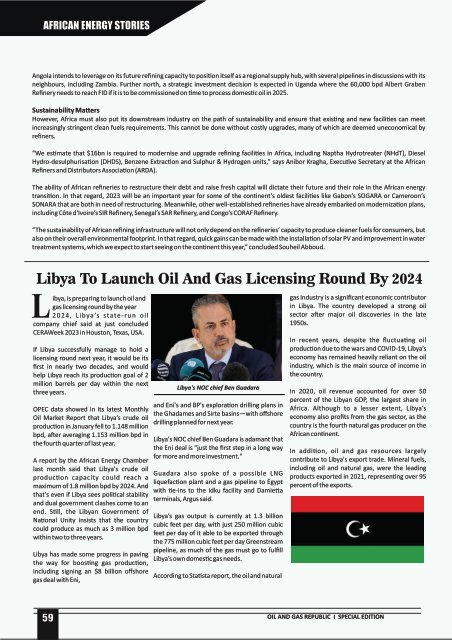The Energy Republic February - March Edition 2023
A special publication focused on the Sub-Saharan Africa oil and gas industry with industry updates about the project and investment opportunities in the continent. In this edition, we also featured interesting stories about the energy sector as well as the role of bioenergy resources in the global energy transition agenda, with a spotlight on Germany's biofuel industry, coupled with stakeholders' commentaries and an exclusive interview with Elmar Baumann, Managing Director of the Association of the German Biofuel Industry (VDB).
A special publication focused on the Sub-Saharan Africa oil and gas industry with industry updates about the project and investment opportunities in the continent.
In this edition, we also featured interesting stories about the energy sector as well as the role of bioenergy resources in the global energy transition agenda, with a spotlight on Germany's biofuel industry, coupled with stakeholders' commentaries and an exclusive interview with Elmar Baumann, Managing Director of the Association of the German Biofuel Industry (VDB).
You also want an ePaper? Increase the reach of your titles
YUMPU automatically turns print PDFs into web optimized ePapers that Google loves.
AFRICAN ENERGY STORIES<br />
Angola intends to leverage on its future refining capacity to posi on itself as a regional supply hub, with several pipelines in discussions with its<br />
neighbours, including Zambia. Further north, a strategic investment decision is expected in Uganda where the 60,000 bpd Albert Graben<br />
Refinery needs to reach FID if it is to be commissioned on me to process domes c oil in 2025.<br />
Sustainability Ma ers<br />
However, Africa must also put its downstream industry on the path of sustainability and ensure that exis ng and new facili es can meet<br />
increasingly stringent clean fuels requirements. This cannot be done without costly upgrades, many of which are deemed uneconomical by<br />
refiners.<br />
“We es mate that $16bn is required to modernise and upgrade refining facili es in Africa, including Naptha Hydrotreater (NHdT), Diesel<br />
Hydro-desulphurisa on (DHDS), Benzene Extrac on and Sulphur & Hydrogen units,” says Anibor Kragha, Execu ve Secretary at the African<br />
Refiners and Distributors Associa on (ARDA).<br />
<strong>The</strong> ability of African refineries to restructure their debt and raise fresh capital will dictate their future and their role in the African energy<br />
transi on. In that regard, <strong>2023</strong> will be an important year for some of the con nent’s oldest facili es like Gabon’s SOGARA or Cameroon’s<br />
SONARA that are both in need of restructuring. Meanwhile, other well-established refineries have already embarked on moderniza on plans,<br />
including Côte d'Ivoire’s SIR Refinery, Senegal’s SAR Refinery, and Congo’s CORAF Refinery.<br />
“<strong>The</strong> sustainability of African refining infrastructure will not only depend on the refineries’ capacity to produce cleaner fuels for consumers, but<br />
also on their overall environmental footprint. In that regard, quick gains can be made with the installa on of solar PV and improvement in water<br />
treatment systems, which we expect to start seeing on the con nent this year,” concluded Souheil Abboud.<br />
Libya To Launch Oil And Gas Licensing Round By 2024<br />
Libya, is preparing to launch oil and<br />
gas licensing round by the year<br />
2 0 2 4 , L i b ya ’s state-run o i l<br />
company chief said at just concluded<br />
CERAWeek <strong>2023</strong> in Houston, Texas, USA.<br />
If Libya successfully manage to hold a<br />
licensing round next year, it would be its<br />
first in nearly two decades, and would<br />
help Libya reach its produc on goal of 2<br />
million barrels per day within the next<br />
three years.<br />
OPEC data showed in its latest Monthly<br />
Oil Market Report that Libya’s crude oil<br />
produc on in January fell to 1.148 million<br />
bpd, a er averaging 1.153 million bpd in<br />
the fourth quarter of last year.<br />
A report by the African <strong>Energy</strong> Chamber<br />
last month said that Libya's crude oil<br />
produc on capacity could reach a<br />
maximum of 1.8 million bpd by 2024. And<br />
that's even if Libya sees poli cal stability<br />
and dual government clashes come to an<br />
end. S ll, the Libyan Government of<br />
Na onal Unity insists that the country<br />
could produce as much as 3 million bpd<br />
within two to three years.<br />
Libya has made some progress in paving<br />
the way for boos ng gas produc on,<br />
including signing an $8 billion offshore<br />
gas deal with Eni,<br />
Libya's NOC chief Ben Guadara<br />
and Eni's and BP's explora on drilling plans in<br />
the Ghadames and Sirte basins—with offshore<br />
drilling planned for next year.<br />
Libya's NOC chief Ben Guadara is adamant that<br />
the Eni deal is "just the first step in a long way<br />
for more and more investment."<br />
Guadara also spoke of a possible LNG<br />
liquefac on plant and a gas pipeline to Egypt<br />
with e-ins to the Idku facility and Damie a<br />
terminals, Argus said.<br />
Libya’s gas output is currently at 1.3 billion<br />
cubic feet per day, with just 250 million cubic<br />
feet per day of it able to be exported through<br />
the 775 million cubic feet per day Greenstream<br />
pipeline, as much of the gas must go to fulfill<br />
Libya’s own domes c gas needs.<br />
According to Sta sta report, the oil and natural<br />
gas industry is a significant economic contributor<br />
in Libya. <strong>The</strong> country developed a strong oil<br />
sector a er major oil discoveries in the late<br />
1950s.<br />
In recent years, despite the fluctua ng oil<br />
produc on due to the wars and COVID-19, Libya’s<br />
economy has remained heavily reliant on the oil<br />
industry, which is the main source of income in<br />
the country.<br />
In 2020, oil revenue accounted for over 50<br />
percent of the Libyan GDP, the largest share in<br />
Africa. Although to a lesser extent, Libya’s<br />
economy also profits from the gas sector, as the<br />
country is the fourth natural gas producer on the<br />
African con nent.<br />
In addi on, oil and gas resources largely<br />
contribute to Libya's export trade. Mineral fuels,<br />
including oil and natural gas, were the leading<br />
products exported in 2021, represen ng over 95<br />
percent of the exports.<br />
59<br />
OIL AND GAS REPUBLIC I SPECIAL EDITION















